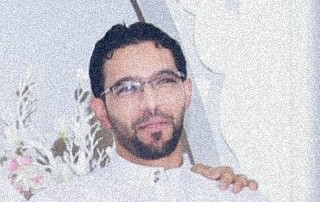Sadiq is the brother of Isa Jaafar AlAbd, the subject of a previous profile. Sadiq Jaafar AlAbd was a 24-year-old Bahraini student when he was arrested in 2018 without an arrest warrant. He endured enforced disappearance, torture, unfair trial, insults based on his sect, deprivation from practicing his religious rituals, and reprisal. He was due to be released in 2020 under a royal pardon that included him and many other prisoners. However, he was returned for investigation in a new case that was fabricated against him, which he discovered after the pardon was issued. He is currently serving a seven-year prison sentence on charges of political background in Jau Prison.
On 26 February 2018, riot police officers, officers from the Ministry of Interior (MOI), along with officers in plain clothing and masks, raided Sadiq’s home and apprehended him. The officers did not provide a reason for his arrest; although they claimed to have an arrest warrant, they failed to produce it when Sadiq’s family requested to see it. During the raid and arrest, the officers beat and kicked him, with a focus on his head.
Officers then transferred Sadiq to the Criminal Investigations Directorate (CID), beating him in the vehicle en route. They held him there incommunicado for three days, during which, on the third day, he was able to call his family and simply inform them that he was under investigation. After these three days, the officers transferred him to an initially undisclosed location (which his family found out later to be Building 15 of Jau Prison), where he disappeared for 10 days.
During his disappearance, officers subjected Sadiq to torture to coerce a confession, including physical beatings, harassment, and insults based on religion. The officers interrogated him while he was blindfolded and denied him access to his lawyer during the interrogation period. Though Sadiq initially denied the allegations, he eventually signed a prepared confession out of fear of further torture.
Approximately three weeks after his arrest, officers transferred Sadiq to the Dry Dock Detention Center pending trial. On 23 April 2018, he was transferred to the Public Prosecution Office (PPO) and charged with harboring fugitives, who are a relative and another individual from the same village. On 30 September 2018, Sadiq was convicted and sentenced to three years in prison on the charge of harboring fugitives and was subsequently transferred to Jau Prison. The Court of Appeal upheld his conviction and sentence on 29 January 2019.
On 18 March 2020, a royal pardon was issued, intending to replace prison sentences with alternative sentences for many prisoners, including Sadiq. Despite being slated for release, Bahraini authorities kept him in prison due to another undisclosed case. Subsequently, on 25 March 2020, authorities transferred him to the Dry Dock Detention Center. In detail, officers compelled Sadiq to sign a document stating that he had not completed his previous sentence, thus requiring him to fulfill the sentence for harboring fugitives until 25 February 2020. Sadiq signed the document out of fear of further torture, even though he was on the release list.
During his time at the Dry Dock Detention Center, Sadiq was subjected to ill-treatment by First Lieutenant Ebrahim AlJasim, who prevented him from reciting the Adhan and threatened to “pull his throat out” if he did. The Lieutenant transferred him to the police station, where he left him with hands tied in a cross formation until the end of his shift. During this period, AlAbd was also denied the opportunity to perform the Maghreb prayer. After the end of the lieutenant’s shift, the officers uncuffed Sadiq and returned him to his cell.
On 13 September 2020, the court sentenced Sadiq to seven years in prison on charges of: 1) joining a terrorist group, and 2) acquiring and possessing incendiary bottles (Molotov), and illegal assembly. However, Sadiq was in prison in 2018 during the alleged date of this crime. Despite his appeal, the Court of Appeal upheld the ruling on 28 December 2020, and the Court of Cassation also affirmed the decision.
Sadiq’s arbitrary detention, forced disappearance, solitary confinement, torture, insult based on his sect, deprivation of his right to perform his religious rituals, unfair trial, reprisal, and denial of his right to benefit from the alternative punishment law represent violations of Bahrain’s obligations under its Constitution and international treaties. These treaties include the Convention against Torture and Other Cruel, Inhuman or Degrading Treatment or Punishment (CAT), the International Convention on the Elimination of All Forms of Racial Discrimination (CERD), the International Covenant on Civil and Political Rights (ICCPR), and the International Covenant on Economic, Social and Cultural Rights (ICESCR).
Therefore, Americans for Democracy & Human Rights in Bahrain (ADHRB) calls on the Bahraini government for the immediate and unconditional release of Sadiq. It also urges Bahrain to investigate allegations of arbitrary arrest, enforced disappearance, solitary confinement, torture, sect-based insults, deprivation of his right to practice his religious rituals, and reprisal, with a commitment to holding perpetrators accountable. Furthermore, ADHRB calls on Bahrain to compensate Sadiq for all the violations he endured in prison, or at the very least, to conduct a fair retrial for him, leading to his release.





